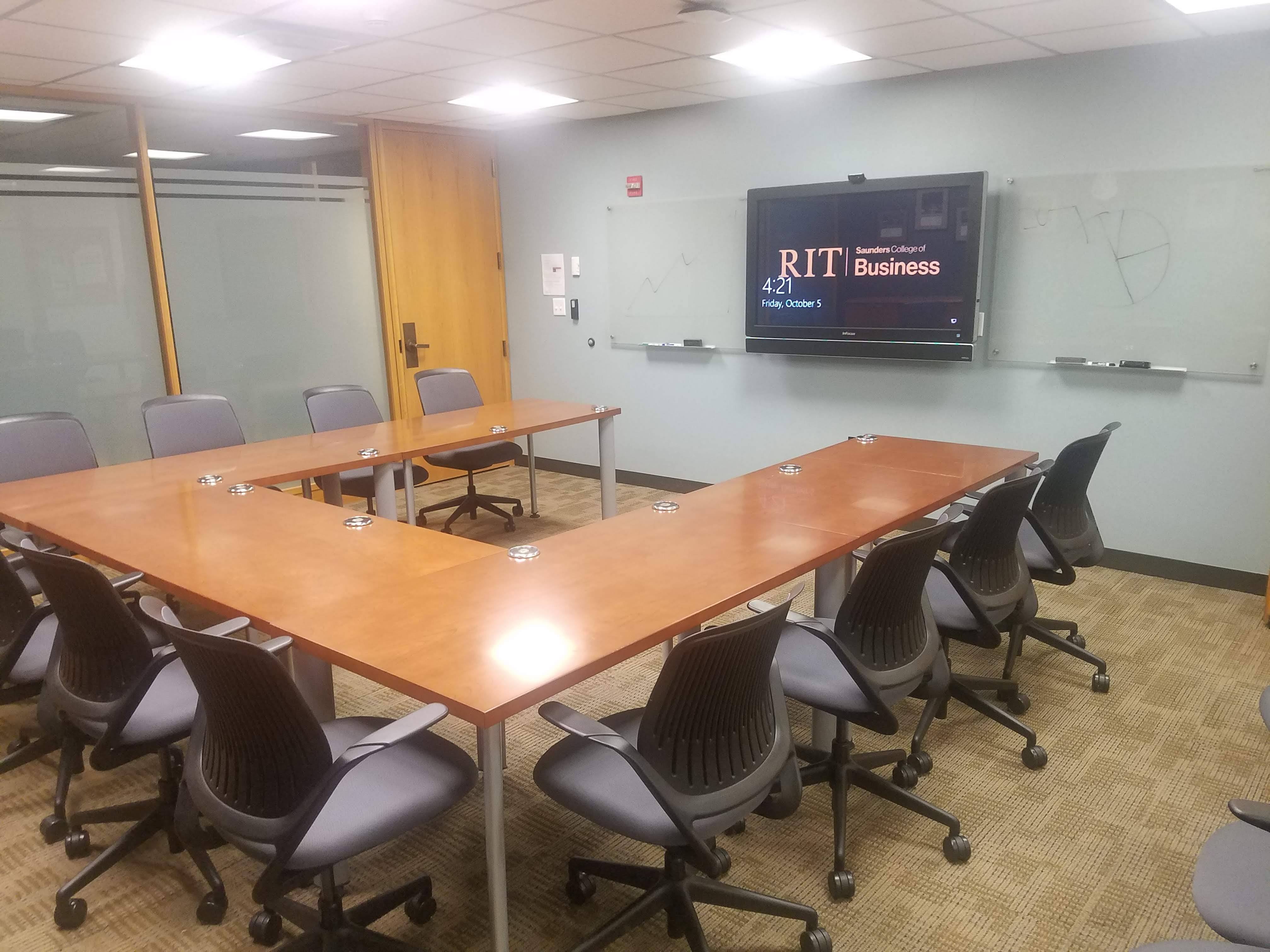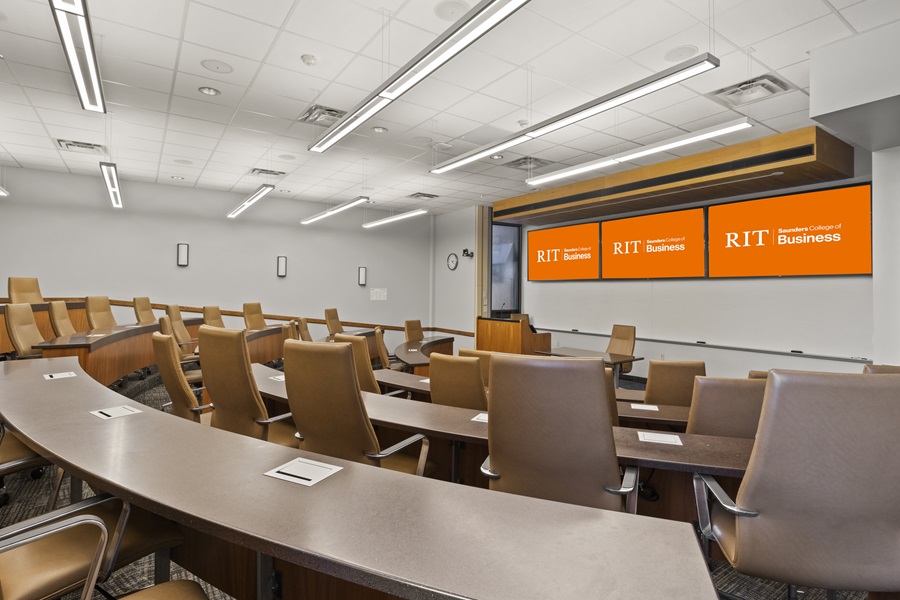Business Administration–Executive Master of Business Administration (MBA) Degree

Business Administration–Executive
Master of Business Administration (MBA) Degree
- RIT /
- Rochester Institute of Technology /
- Academics /
- Business Administration–Executive MBA
Overview for Business Administration–Executive MBA
The Princeton Review, U.S. News & World Report, and Poets&Quants rank RIT's executive MBA among the best nationally.
A 15-month, four-semester program that begins in August and finishes in November of the following year.
The executive MBA is a cohort-based program, where all students enter the program at the same time and move through the courses with their initial cohort.
Students enrolled in traditional electives are required to attend the international seminar, which is a seven-to-10 day educational trip near the end of the program. Students enrolled in life sciences electives have the opportunity to travel to NYC for two-to-three days to explore New York state’s life sciences ecosystem.
RIT's executive MBA is a challenging program designed to accelerate the careers of experienced, high-performing professionals with six or more years of business experience. It is ideal for creative, innovative individuals with established careers who are looking for proven and effective methods and strategies to propel them further up the career ladder or transition into a new field.
RIT's Executive MBA: An Applied Academic and Strategic-Focused Experience
We know you want more than a simple transfer of business and management theory and concepts. You want a high level of engagement with faculty and especially with your peers. The opportunity to discuss, argue, compete, and collaborate with other seasoned managers on strategic and topical issues and projects is an essential feature of a strong executive MBA program, and of one that has direct and immediate applicability to your professional development. RIT's executive MBA program is designed to deliver these highly sought-after experiences.
In the executive MBA program, you will master executive skills such as strategic and cross-functional thinking, utilizing data to drive decision making, client consulting, and leadership. You will learn from knowledgeable and professional instructors and from the motivated and diverse peer group enrolled in the program. The executive MBA program encourages analytical thinking and problem solving and places a strong emphasis on collaboration and group interaction.
Executive MBA Courses
The curriculum in RIT's executive MBA program focuses on core business concepts that provide fundamental skills, knowledge, and perspectives in accounting, statistics, leadership, finance, negotiations, and economics. The program develops skills in cross-functional analysis with an emphasis on strategy, marketing, technology, and international business. Interdisciplinary examples, case analyses, and an applied orientation are key components of the program. The program’s courses are scheduled across four consecutive semesters (fall, spring, summer, fall), with one course per semester merged with the online executive MBA program. Students are enrolled in two courses at a time, which are delivered in a hybrid format over a 6 week period. On campus courses take place weeks 1 and 5 on Friday and Saturday from 7:30 a.m. to 4:30 p.m. One live virtual session takes place week 3 on Saturday 8am-12:30pm EST.
In addition, all students attend a three-day orientation at the start of the program and a seven-to-10-day international seminar in their last semester. The program takes advantage of local and regional relationships with area businesses, and students have the opportunity to tour various businesses and interact with company leaders during the program, especially during the culminating Capstone Consulting project.
-
30% Tuition Scholarship for NY Residents and Graduates
Now is the perfect time to earn your Master’s degree. If you’re a New York state resident with a bachelor’s degree or have/will graduate from a college or university in New York state, you are eligible to receive a 30% tuition scholarship.
-
Next Steps to Enroll
Accept your offer of admission and take the next steps toward becoming an RIT Tiger.
Careers and Salary Info
Typical Job Titles
| Analyst | CFO | Corporate Financial Analyst |
| Data Scientist | Project Manager | Strategic Accounts |
| Senior Account Manager |
Featured Work and Profiles
-
The Business of Purpose-Driven Success: How Christina Gullo is Redefining Leadership
Christina Gullo ’06 Christina Gullo, owner of True North Executive Solutions, LLC, is a dynamic leader with a legacy of transformation. As President/CEO of Villa of Hope (2010-2023), she spearheaded a fiscal turnaround,...
Read More about The Business of Purpose-Driven Success: How Christina Gullo is Redefining Leadership -
Championing Veterans: How J'nez Thomas drives impactful change
J'nez Thomas ’20 J’nez Thomas‘20 builds community by championing veteran success. As first runner-up for the 2023 Ms. Veteran America national competition, she’s found versatility in communication, a core military...
Read More about Championing Veterans: How J'nez Thomas drives impactful change -
Engineering Success: How an Executive MBA Elevated Leadership
Kailee Polimeni ’24 "Work gets the most of me, but it doesn’t get the best of me." Starting as an engineer and co-op supervisor at Advanced Automation Technologies, Kailee Polimeni ‘24, found this phrase rang true...
Read More about Engineering Success: How an Executive MBA Elevated Leadership -
From Recreation Leader to Community Catalyst
Michael Cocquyt '18, Senior Program Manager at LaBella Associates, stepped into a whole new career thanks to the program connecting him with diverse classmates and applicable learning.
Read More about From Recreation Leader to Community Catalyst -
Get your cell phone wet? Redux has a solution.
Reuben Zielinski ’85 (electrical engineering), ’96 (EMBA) developed patented vacuum drying technology that removes moisture from electronic devices including cell phones, tablets, and hearing devices....
Read More about Get your cell phone wet? Redux has a solution.
Curriculum for 2024-2025 for Business Administration–Executive MBA
Current Students: See Curriculum Requirements
Business Administration - Executive MBA degree, typical course sequence
| Course | Sem. Cr. Hrs. | |
|---|---|---|
| Residency | ||
| MGMT-806 | Team Building and Ethics |
1 |
During this one-week course, students will understand how to motivate and lead teams as well as how to support the leadership of others. Students will undertake a critical evaluation of the ethical responsibilities of managers and corporations. Each incoming student joins a study group of around four or five students selected for diversity of skills and experience. This course also serves as a general orientation for incoming EMBA students. Lecture 1 (Summer). | ||
| First Year | ||
| ACCT-801 | Financial Accounting and Reporting |
2 |
This course provides an understanding of how financial accounting and reporting information are used by stakeholders of corporations, especially external stakeholders such as investors, lenders, and regulators. Topics include standards and practices of financial reporting, analysis of financial statements, and various methods of measurement of financial transactions. (This class is restricted to degree-seeking graduate students or those with permission from instructor.) Lecture 2 (Fall, Spring). | ||
| ACCT-802 | Managerial Accounting |
2 |
Managerial Accounting emphasizes identifying and applying common techniques used by organizations to improve operational efficiency and effectiveness, improve profitability and control costs, among others. The course focuses on understanding how managerial accounting is used to help organizations achieve their goals. (Prerequisites: ACCT-801 or equivalent course.) Lecture 2 (Fall, Spring). | ||
| DECS-810 | Statistical Analysis for Managers |
2 |
This course introduces concepts for interpreting and analyzing data as a tool for assisting managers in making complex business decisions. Topics to be covered include: review of descriptive statistics, normal distribution, sampling distributions, estimation, test of hypothesis for single and two populations, linear regression, multiple regression and model building. The application of appropriate statistical tools will be required. (This class is restricted to degree-seeking graduate students or those with permission from instructor.) Lecture 2 (Fall). | ||
| ESCB-840 | Microeconomics & Pricing |
2 |
This course introduces microeconomic concepts and how they can be employed to examine business decisions such as pricing under conditions of uncertainty. Models and applications are employed that describe the efficient allocation of resources within a firm. Topics include supply and demand, consumer behavior, production, cost and pricing. (This class is restricted to degree-seeking graduate students or those with permission from instructor.) Lecture 2 (Fall). | ||
| FINC-845 | Valuation and Capital Budgeting |
2 |
The course introduces financial concepts of risk, return and valuation. The main application studied in this course, Capital Budgeting, arises in the corporate setting where managers allocate scarce resources to projects. Basic issues of capital budgeting covered include cash flow estimation and valuation techniques. Advanced issues include sensitivity analysis and the consideration of real options. (Prerequisites: ACCT-802 or equivalent course. Corequisites: DECS-810 or equivalent course.) Lecture 2 (Spring). | ||
| FINC-846 | Financial Planning and Analysis |
2 |
This is the second-part of a two-course corporate finance sequence for EMBA students. The overall theme is one of strategic control of corporate assets and liabilities. The five topics covered in this course are: (a) long-term financial planning, corporate financing and cost of capital (b) short-term financial planning and the analysis of short-term assets and liabilities (c) risk management and the corporate use of derivatives (d) the analysis of international activities (e) corporate control activities. Three topics are explored in depth: short-term financial management, capital structure and dividend policy, and risk and hedging. Short-term financial management includes the topics of credit analysis, financial forecasting and planning, working capital management and cash flow management. (Prerequisites: FINC-845 or equivalent course.) Lecture 2 (Spring). | ||
| MGMT-800 | Leadership Development I |
1 |
This course builds on the assessment activities that are part of course MGMT-806. Each student participates in a 360-degree leadership assessment process. Based on this formal review, personal development plans are created and serve as dynamic documentation of individual professional progress. Students arrange individual counseling sessions with a leadership coach. Students then take action on the feedback received in order to develop self awareness. (Corequisite: MGMT-806 or equivalent course) Lecture 1 (Summer). | ||
| MGMT-810 | Leadership |
2 |
This course focuses on the role of the general manager as a leader in an organization. The course addresses analytical and behavioral strategies and techniques for leadership by examining problem-solving models, personal values, and communications. The emphasis is on the interpersonal skills needs to express different leadership styles and behaviors. Cases, exercises, and class discussions will be used to examine and explore opportunities for managers to become more effective as leaders in modern organizations. (Prerequisites: MGMT-806 or equivalent course.) Lecture 2 (Fall). | ||
| MGMT-818 | Strategic Thinking I |
2 |
The primary theme of this course is to examine how firms can achieve superior financial performance through the establishment of a sustainable competitive advantage at the business level. Contemporary theories of strategic management will be discussed and critically examined for their relevance to the problems facing many of today's managers. Topics include analysis of industry attractiveness, value-chain analysis, core competencies, and business-level strategies. (Prerequisites: ESCB-840 and FINC-845 or equivalent courses.) Lecture 2 (Spring). | ||
| MGMT-819 | Strategic Thinking II |
2 |
This course covers corporate-level strategy and strategy implementation. The focus of the course is on the strategy of the firm as a whole, and the interrelations between different divisions. Topics will include related and unrelated diversification, and the various means of engaging in diversification, mergers and acquisitions, joint ventures, and strategic alliances. Contemporary theories of strategic management will be discussed and critically examined for their relevance to the problems facing many of today's managers. (Prerequisites: MGMT-818 or equivalent course.) Lecture 2 (Spring). | ||
| MGMT-850 | Negotiations and Decision-making |
2 |
This course is designed to teach the art and science of negotiation so that one can negotiate successfully in a variety of settings, in day-to-day experiences and, especially, within the broad spectrum of negotiation problems faced by managers and other professionals. Individual class sessions will explore the many ways that people think about and practice negotiations skills and strategies in a variety of contexts. Special emphasis will be on decision-making biases that are often inherent in any negotiation setting and compromise the quality of negotiated agreements. Lecture 2 (Fall, Spring). | ||
| MKTG-851 | Marketing Strategy |
2 |
A general management perspective on the critical impact of marketing in organizations. Topics include an overview of the marketing process, market research, segmentation, and target markets. The focus is on the process of creating, communicating, and delivering customer value through the marketing mix. The course is structured around the managerially controllable elements of product, price, promotion and distribution, plus the interrelationships of these elements. (Pre or Corequisites: MGMT-818 or equivalent course.) Lecture 2 (Spring). | ||
| Second Year | ||
| DECS-864 | Systems Support for Operations |
2 |
This course focuses on the application of information technology to gain greater efficiency and effectiveness from operational and managerial processes and systems. The conceptual foundations of operations, supply chain management and information technology are surveyed and contemporary approaches analyzed from a managerial perspective. Lecture 2 (Summer). | ||
| DECS-875 | Business Simulation |
2 |
Teams of students manage a company in a computer simulated oligopoly industry, competing against companies managed by other student teams. The overall purpose of the Business Simulation course is to: enhance the participant's ability to make effective business decisions; encourage cross-functional thinking; foster strategic and systems thinking; and enhance team building and reinforce continuous improvement opportunities. (Prerequisites: MGMT-818 and FINC-845 or equivalent courses.) Lecture 2 (Summer). | ||
| MGMT-801 | Leadership Development II |
1 |
This course is a continuation of MGMT-800. Leadership Development II requires student to explore and expand their potential as leaders. Through self and peer assessment, one-on-one coaching, career counseling, and written assignments, students develop leadership goals and create a plan to realize those goals. Students arrange individual counseling sessions with a leadership coach. (Prerequisites: MGMT-800 or equivalent course.) Lecture 1 (Fall). | ||
| MGMT-861 | Managing Technology, Innovation and Research |
2 |
This course deals with the responsibilities and challenges faced by managers responsible for research and innovation within high- technology firms. Topics will include: the critical role of innovation, internal technology assessments, technology transfer, the selection and management of R&D projects, and the identification of and management of disruptive technologies and business models. Particular attention will be given to overcoming systemic barriers to innovation. (Prerequisites: MGMT-818 or equivalent course.) Lecture 2 (Summer). | ||
| MGMT-889 | Capstone Consulting Project I |
3 |
Teams of students analyze specific operational problems or improvement opportunities in client organizations. Under the guidance of a faculty supervisor, teams identify relevant issues, collect data, develop alternatives and make recommendations to the client. The project, a two-course equivalent, is the capstone experience of the Executive MBA program. (Prerequisites: MGMT-818 and FINC-846 and MKTG-851 or equivalent courses.) Lecture 3 (Summer). | ||
| MGMT-890 | Capstone Consulting Project II |
3 |
This course is a continuation of MGMT-889. Teams of students analyze specific operational problems or improvement opportunities in client organizations. Under the guidance of a faculty supervisor, teams identify relevant issues, collect data, develop alternatives and make recommendations to the client. The project, a two-course equivalent, is the capstone experience of the Executive MBA program. (Prerequisites: MGMT-889 or equivalent course.) Lecture 3 (Fall). | ||
| MKTG-865 | Managing New Product Commercialization |
2 |
This course emphasizes the marketing and product strategy activities required to create, develop, and launch successful new products. Topics covered include identifying the market opportunity for new products, defining the product strategy, understanding customer requirements, developing and updating the product business plan, marketing's role in the product development process, developing the marketing plan for launching new products, and managing the product life cycle. Best practices in activities required for successful new product commercialization are reviewed. (Prerequisites: MKTG-851 or equivalent course.) Lecture 2 (Summer). | ||
Approved Electives |
8 | |
| Total Semester Credit Hours | 47 |
|
Approved Electives
Students must choose eight (8) or more credits in one (1) track:
| Track 1: Traditional MBA Electives | ||
| FINC-850 | International Finance |
|
This course examines how the international environment affects the practice of corporate finance by using a combination of theory and cases. Topics include an examination of the international environment the firm operates in, international investment, exchange rates and the management of risks arising from shifting exchange rates, and the problems of short and long-term asset and liability management. (Prerequisites: FINC-846 or equivalent course.) Lecture 2 (Fall). | ||
| INTB-820 | International Business |
|
The primary objective of the course is to examine the strategies, concepts, theories, and practices associated with conducting international business. It seeks to develop practical and theoretical problem solving skills needed in the global business environment. (This class is restricted to degree-seeking graduate students or those with permission from instructor.) Lecture 2 (Fall). | ||
| INTB-825 | International Study Seminar |
|
This international study tour is an integral part of semester long focus on the strategic and operational issues facing organizations in a global competitive environment. Students will engage in lectures, plant visits, and interviews with international corporate managers. Students will apply the insights gained from their previous and concurrent coursework. This seminar offers students an inside view of individual companies and industries, and some of the broader economic, political, social, and cultural factors that influence business opportunities and practices in a particular region of the world. (Corequisites: INTB-820 or equivalent course.) Lecture 2 (Fall). | ||
| MGMT-860 | Executive Leadership Series |
|
The course explores leadership topics in depth with an emphasis on current management and leadership issues. During each class a community leader guest lectures on topics of leadership. Past speakers have included senior-level executives from local industry, government, and not-for-profit organizations. (Prerequisites: MGMT-810 or equivalent course.) Lecture 2 (Fall). | ||
| Track 2: Life Science Electives | ||
| BIME-607 | Graduate Biodesign |
|
This course is a graduate-level introduction to the biodesign process used for innovating medical technologies. Student teams will apply a needs-based assessment strategy to identify opportunities in a biomedical related field such as assistive technologies and rehabilitation engineering. Incorporating CAD will culminate in a virtual medical device prototype. Concepts of intellectual property, regulatory considerations, and reimbursement and business models will be introduced. (This course is restricted to Graduate students.) Lecture 3 (Fall). | ||
| BIME-617 | Principles of Biomedical Device Regulations |
|
This course will present the principles and fundamentals of medical device and in vitro diagnostic regulation. The course will cover the history of the FDA and the regulations around food, drug and cosmetic products. An overview of regulatory pathways, clinical trials, good manufacturing practices and quality system design will be covered. Comparisons between US, EU and other international regulatory bodies will also be discussed. The course will culminate with students developing a clinical trial and regulatory strategy for a new hypothetical medical device. (This course is restricted to Graduate students.) Lecture 3 (Fall). | ||
| BIOL-625 | Ethics in Bioinformatics |
|
This course will be focused on individual and organizational responsibilities in bioinformatics research, product development, product commercialization and clinical and consumer genetic testing. (This course is restricted to students in the BIOINFO-MS, BIOINFO-BS/MS program.) Lecture 3 (Fall). | ||
| BIOL-689 | Graduate Special Topics |
|
This is a graduate course on a topic that is not part of the formal curriculum. This course is structured as an ordinary course and has specific prerequisites, contact hours, and examination procedures. Lec/Lab (Fall, Spring, Summer). | ||
| STAT-614 | Applied Statistics |
|
Statistical tools for modern data analysis can be used across a range of industries to help you guide organizational, societal and scientific advances. This course is designed to provide an introduction to the tools and techniques to accomplish this. Topics covered will include continuous and discrete distributions, descriptive statistics, hypothesis testing, power, estimation, confidence intervals, regression, one-way ANOVA and Chi-square tests. (This class is restricted to degree-seeking graduate students or those with permission from instructor.) Lecture 3 (Fall). | ||
Admissions and Financial Aid
This program is available on-campus only.
| Offered | Admit Term(s) | Application Deadline | STEM Designated |
|---|---|---|---|
| Full‑time | Fall | June 30 | No |
Full-time study is 9+ semester credit hours. International students requiring a visa to study at the RIT Rochester campus must study full‑time.
Application Details
To be considered for admission to the Business Administration–Executive MBA program, candidates must fulfill the following requirements:
- Complete the Executive MBA graduate application.
- Submit copies of official transcript(s) (in English) of all previously completed undergraduate and graduate course work, including any transfer credit earned.
- Hold a baccalaureate degree (or US equivalent) from an accredited university or college. A minimum cumulative GPA of 3.0 (or equivalent) is recommended.
- Submit a current resume or curriculum vitae.
- Submit a personal statement consisting of 1) a description of a significant workplace challenge and how you resolved it and 2) your rationale for choosing RIT’s Online EMBA program to enhance and fulfill your career objectives.
- Submit three letters of recommendation.
- Entrance exam requirements: None
- Submit English language test scores (TOEFL, IELTS, PTE Academic), if required. Details are below.
English Language Test Scores
International applicants whose native language is not English must submit one of the following official English language test scores. Some international applicants may be considered for an English test requirement waiver.
| TOEFL | IELTS | PTE Academic |
|---|---|---|
| case by case | case by case | case by case |
International students below the minimum requirement may be considered for conditional admission. Deaf and hard-of-hearing test takers with significant hearing loss do not need to take the listening and speaking sections for the TOEFL and IELTS. Each program requires balanced sub-scores when determining an applicant’s need for additional English language courses.
How to Apply Start Your Application
Cost and Financial Aid
Tuition for the Executive MBA includes course materials, travel costs for trips, and access to RIT services.
Every Executive MBA student is eligible for exclusive program scholarships based on need and qualifications that can be combined with select company-sponsored plans, and qualifying discounts.
Related News
-
December 10, 2024

EMBA student leverages RIT for inclusive leadership growth
Chris Soukup, a graduate student in the RIT Executive MBA program, is the CEO of Communication Service for the Deaf, a nonprofit organization that provides resources and services to benefit the Deaf and hard-of-hearing community in the employment sector. -
August 30, 2024

Saunders College of Business unveils upgraded Max Lowenthal Hall with ‘Opening Bell’ ceremony
Designed by LaBella Associates, this $25 million expansion almost doubles the size of RIT’s business college, adding more than 35,000 square feet of renovated classrooms, applied research and case analysis labs, a state-of-the-art auditorium and café, and more.
-
August 7, 2024

The Princeton Review’s Top On-Campus MBA Programs Released
Saunders College of Business at Rochester Institute of Technology made The Princeton Review’s combined list of top on-campus MBA programs in the country as part of its Best Business Schools 2024 rankings
Contact
- Julianne Fiori
- Senior Admissions Officer
- Saunders Executive Education
- Saunders College of Business
- 585‑475‑2729
- jfiori@saunders.rit.edu
Saunders College of Business






















